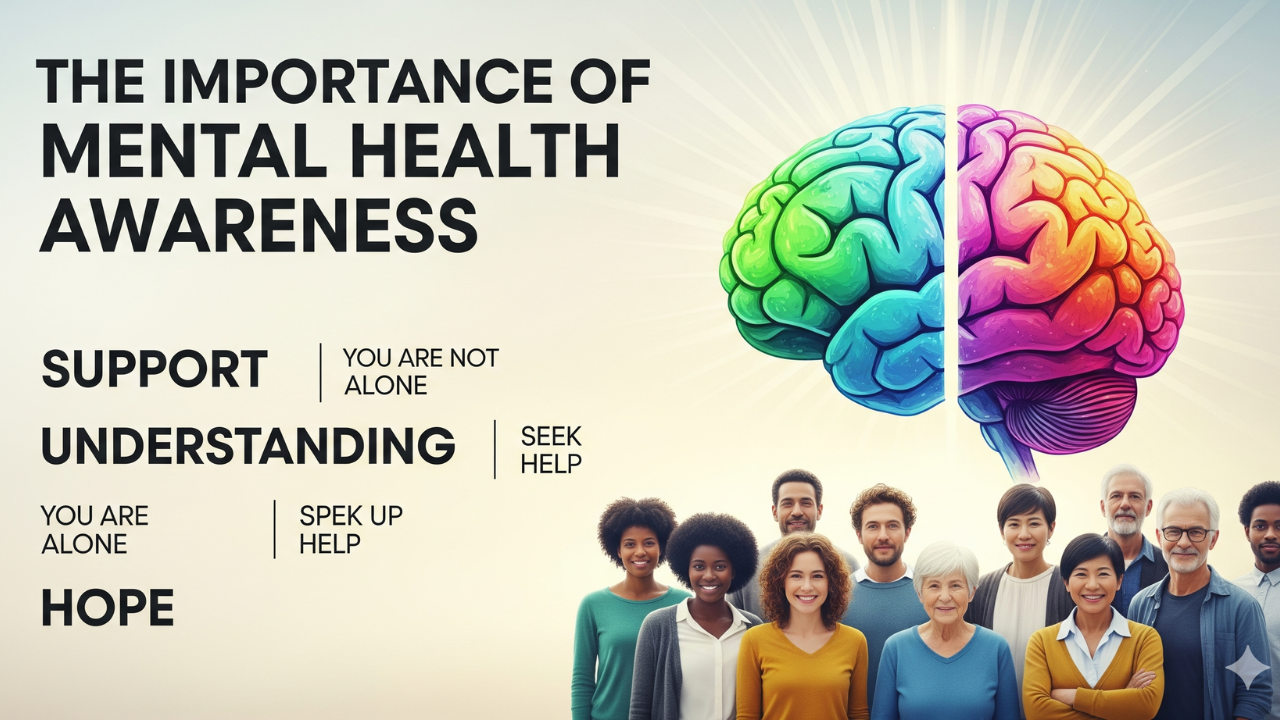Mental health is a crucial aspect of our overall well-being, yet it often takes a backseat in conversations. As we navigate the complexities of life, understanding and promoting mental health awareness in our communities becomes more essential than ever. Mental illnesses affect countless lives, but many people still don’t feel comfortable discussing them openly. By taking proactive steps to raise awareness, we can help break down barriers and create a supportive environment for those struggling with their mental health.
Imagine a world where everyone feels safe sharing their experiences without fear of judgment or stigma. This vision is not just wishful thinking; it’s achievable. Through education, community events, and support for local resources, we can foster an inclusive atmosphere that prioritizes mental wellness. Let’s explore how each of us has the power to make a difference by promoting mental health awareness within our own circles!
The Importance of Mental Health Awareness

Mental health awareness is vital for fostering a healthy society. It helps people recognize that mental well-being is just as important as physical health. When communities prioritize mental health, they create an environment where individuals feel valued and understood.
Raising awareness not only educates people about various mental illnesses but also encourages open discussions. These conversations can lead to early intervention and support, preventing issues from escalating. Knowledge empowers individuals to seek help without shame or fear.
Additionally, a culture of awareness reduces stigma associated with mental illness. This shift allows those affected to share their experiences freely, paving the way for empathy and understanding among peers.
Promoting mental health awareness strengthens our connections within the community and fosters resilience in everyone. It lays the groundwork for healthier lives by encouraging compassion and support across all age groups and backgrounds.
Different Types of Mental Illnesses and Their Prevalence
Mental illnesses encompass a wide range of conditions that affect mood, thinking, and behavior. Common disorders include anxiety, depression, bipolar disorder, and schizophrenia. Each has its own unique symptoms and challenges.
Anxiety disorders are the most prevalent mental health issues worldwide. They can manifest as excessive worry or panic attacks. Depression follows closely behind, impacting millions with feelings of hopelessness or worthlessness.
Bipolar disorder is characterized by extreme mood swings. These shifts can lead to periods of mania followed by deep depressive episodes. Schizophrenia affects how individuals perceive reality and may involve hallucinations or delusions.
Understanding these various types helps demystify mental illness in our communities. It fosters compassion for those affected while encouraging open discussions about their realities. Awareness is key to reducing barriers around treatment access and support services available locally.
Stigma Surrounding Mental Health

Stigma surrounding mental health remains a significant barrier for many. It can prevent individuals from seeking help, leaving them to struggle in silence. The fear of being judged or misunderstood often outweighs the desire for support.
This stigma is rooted in stereotypes and misinformation. Many people still associate mental illness with weakness or instability, which could not be further from the truth. Mental health issues can affect anyone, regardless of age, gender, or background.
Discussions around mental well-being are essential to dismantle these harmful perceptions. Sharing personal stories and experiences fosters understanding and compassion within communities.
Moreover, education plays a crucial role in changing attitudes toward mental health. When we provide accurate information and challenge misconceptions, we create an environment where individuals feel safe to express their struggles without fear of judgment.
Ways to Promote Mental Health Awareness in Your Community
Promoting mental health awareness in your community can take many forms. Start by hosting workshops that focus on understanding mental health issues and available resources.
You could also collaborate with local schools to integrate mental health education into their curriculum. This empowers young people to understand and discuss these topics openly.
Consider organizing community events like walks or runs themed around mental wellness. These activities not only raise awareness but foster a sense of unity among participants.
Create social media campaigns that share personal stories, stats, and helpful tips related to mental health. Engaging visuals can make this information more accessible.
Encourage local businesses to display informational flyers or host “mental health days” offering support services for employees. Every small effort counts toward building a supportive environment where conversations about mental well-being are normalized and encouraged.
Educating Others
Educating others about mental health awareness is crucial for fostering understanding and empathy. Knowledge can dismantle misconceptions that often lead to stigma.
Start by sharing reliable resources, such as articles, videos, and podcasts. These materials can provide valuable insights into various mental illnesses and their impact on individuals and families.
Organize workshops or discussions in schools, workplaces, or community centers. Inviting professionals to speak can create an open dialogue about mental health challenges faced in everyday life.
Utilize social media platforms for educational campaigns. Sharing infographics or personal stories can resonate deeply with your audience while sparking conversations around the topic.
Encourage people to ask questions without fear of judgment. An informed community is a supportive one—where everyone feels valued and understood.
Organizing Events and Activities
Organizing events and activities is a powerful way to promote mental health awareness in your community.
Start by brainstorming ideas that resonate with local interests. Workshops, seminars, and panel discussions can provide valuable information while fostering dialogue among participants.
Consider fun events like community walks or art shows where individuals can express themselves creatively. These gatherings create a sense of belonging and encourage open conversations about mental health.
Collaborate with schools, universities, and local businesses for greater outreach. Their resources can enhance visibility and participation.
Don’t forget to incorporate interactive elements such as Q&A sessions or mindfulness workshops. Engaging formats keep the audience invested.
Make use of social media platforms to spread the word ahead of time. Share stories from those willing to speak up; personal experiences often inspire others to join the cause.
Events should feel welcoming—a place where everyone feels comfortable sharing their thoughts on mental well-being.
Supporting Local Organizations and Resources
Supporting local organizations dedicated to mental health can create a ripple effect in your community. These groups often provide crucial resources, training, and support for individuals facing mental illness.
Consider volunteering time or donating funds. Your contributions help these organizations sustain their programs and reach more people in need. Local initiatives often have unique insights into the challenges residents face.
Collaboration is also key. Partner with these organizations to host workshops or seminars that educate the public on mental health issues. This not only raises awareness but also fosters a sense of unity among community members.
Encouraging local businesses to sponsor events can amplify outreach efforts too. When everyone works together, it strengthens the fabric of support available for those struggling with their mental well-being.
Engagement doesn’t stop at participation; sharing information about local resources on social media can extend your impact beyond immediate circles and foster greater connection within your community.
Creating Safe and Inclusive Environments
Creating safe and inclusive environments is vital for promoting mental health awareness. These spaces allow individuals to express themselves without fear of judgment.
Start by fostering open communication. Encourage discussions about feelings and experiences related to mental health. This can help break down barriers and normalize conversations.
Physical spaces matter too. Ensure that your community centers, schools, and workplaces are welcoming and accessible to everyone. Consider features like quiet rooms or designated areas for relaxation.
Train staff on mental health first aid. Equip them with the tools needed to support those who may be struggling silently.
Celebrate diversity in all forms. Recognize different backgrounds, cultures, and identities within your community, ensuring everyone feels valued.
Remember that inclusivity is an ongoing effort. Regularly seek feedback from community members about their needs and experiences to continually improve the environment you create together.
Taking Care of Your Own Mental Health
Taking care of your mental health is crucial. It’s not just about supporting others; it starts with you.
Set aside time for self-care activities that recharge your energy. Whether it’s reading, meditating, or simply taking a walk, find what nourishes your spirit.
Establish healthy boundaries in relationships and work life. Knowing when to say no can protect your mental well-being significantly.
Reach out when you need support. Friends, family, or professional help can provide the understanding and guidance necessary during tough times.
Practice mindfulness to stay grounded in the present moment. This simple technique can alleviate stress and enhance emotional resilience.
Remember to celebrate small victories—acknowledge progress without comparing yourself to anyone else. Every step forward counts in this journey toward better mental health.
Conclusion
Promoting mental health awareness in your community is essential. By understanding the importance of mental health, recognizing different types of mental illnesses, and addressing the stigma that surrounds them, we can create a more compassionate society.
Educating others is a powerful tool. Share knowledge about mental health resources and encourage open conversations. Organizing events like workshops or seminars helps foster dialogue and build connections among community members.
Supporting local organizations dedicated to mental health can amplify their efforts. Volunteering time or donating resources allows you to contribute meaningfully while also raising awareness.
Creating safe environments where people feel comfortable discussing their struggles promotes acceptance and healing. Simple gestures like listening without judgment go a long way in making someone feel valued.
Taking care of your own mental well-being is crucial too. When you prioritize self-care, you’re better equipped to support those around you on their journeys.
By combining these efforts, we contribute to a culture that values both emotional wellness and connection. Let’s work together towards breaking down barriers surrounding mental health awareness for the benefit of everyone.




